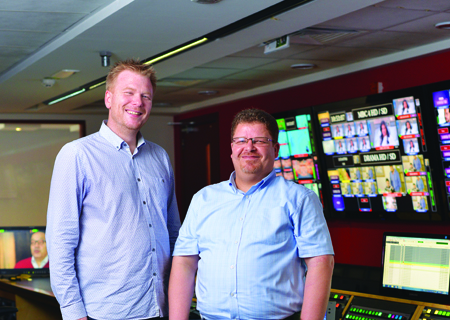MBC Group recently migrated the playout of its Al Arabiya and Al Hadath news channels to Pebble Beach Systems automation. In an exclusive interview with BroadcastPro ME, Senior Manager for Broadcast, Nick Barratt and Broadcast Manager, Bassam Faour share more details about the project.

MBC Group recently migrated the playout of its Al Arabiya and Al Hadath news channels to Pebble Beach Systems automation. In an exclusive interview with BroadcastPro ME, Senior Manager for Broadcast, Nick Barratt and Broadcast Manager, Bassam Faour share more details about the project
MBC Group, the Arab worlds largest free-to-air broadcast network, recently migrated the playout of its 24-hour news channels to Pebble Beach Systems automation. This migration included the transfer of Al Arabiya News Channel and Al Hadath News Channel to Marina control in June 2016.
The broadcaster, headquartered in Dubai, has confirmed that its longer term strategy is to eventually move the playout of all 23 channels to Marina in a phased operation.
Originally an ADC facility, MBC initially deployed a Pebble Beach Systems Neptune playout automation solution around five years ago, but the long-term goal was to implement a Marina solution. Marina deployment involved meeting specific requirements to cater to the demands of a fast-paced news environment.
While Al Arabiya News Channel covers events from across the Arab World to include politics, breaking news and other types of news & information, Al Hadath News Channel focuses on extensive live coverage of events as they happen, coupled with in-depth analysis, be it in the studio or on the ground. They aim to provide and ensure an uninterrupted news feed of current major stories. As with many live news channels, therefore, their scheduling requirements rarely fit a sequential workflow.
Each hour is scheduled to have a number of live segments, each of a nominal duration with commercial segments in between.
In practice, the live segments rarely adhere to the scheduled durations, so the automation system needs to deal with last-second changes and not overthink pre-emption, explains Nick Barratt, Senior Manager Broadcast, MBC Group.
One of the great features of Pebble Beach automation systems is the intelligence behind pre-emption, which enables the automation to make smart decisions about media and devices. However, this can also cause complications in fast-moving live scenarios. We worked extensively with Pebble Beach through this to produce an extremely capable live solution.
Marina was a natural choice after the majority of channels were migrated to Neptune, with the long-term plan to unify all channels on a single automation platform. MBC worked closely with Pebble to fine tune the systems behaviour to fully allow for last-minute adjustments within a fast-paced news environment, where changes are the norm rather than the exception.
This is a pivotal moment for MBC as the broadcaster looks to develop a future-proof, scalable technical infrastructure.
Unifying under the common user experience of an open system with an extensive and evolving library of API integrations allows us to take advantage of the technology changes currently happening in the broadcast world, regardless of manufacturer. We aim to make it totally immaterial to the operator not only what systems underpin the channel they are working on, but also if those systems are physical, virtual or even their location, explains Barratt.
A key factor in this decision is Marinas distributed architecture, according to Barratt, as it has the flexibility to allocate resources as appropriate, rather than being restricted to a fixed client server configuration.
Further deciding factors were the simple user interface, which minimises the training requirement and simplifies the transition process, and Pebbles track record of supporting an open approach to systems and suppliers, adds Bassam Faour, Broadcast Manager, MBC Group.
This allows for a mix of different technology suppliers to work together utilising API interfaces.
In addition to playout, the Marina deployment encompasses traffic integration with ongoing development for integration to the asset management system. It controls both the main and backup Harmonic Spectrum servers via API control, and it was key for MBC to be able to incorporate the Marina system into the existing infrastructure alongside Neptune, which accesses the servers via serial control.
While Neptune is designated as the master system for deleting material no longer required on the server, it has a view into Marinas list media usage to ensure that no deletions are made from the server of media which Marina is scheduled to playout.
Marina controls two chains of best-of-breed high-end devices including decoders, mixers, graphics and Harmonic servers for each channel, via a single Marina playlist.
Samir Isbaih, Regional Manager for the Middle East at Pebble Beach Systems, says: As a specialist vendor, we are adjusting as the market changes, offering a choice of technologies to suit different playout and automation platform requirements, including virtualised IP playout via Orca and our self-contained channel in a box solution, Stingray.
In this region, where Neptune is the dominant automation solution, it is vital to offer a flexible but intelligent migration strategy to the latest platform, which also enables new channels to be launched. The solution at MBC is enabling them to run both systems in tandem and make the transition to the new platform at a pace that suits their business, with our support.
One of the key deciding factors making Marina attractive to MBC is the fact that Marina is an evolving product that Pebble Beach Systems is continuously developing with the intention of adding new features.
Marina is considered the most modern enterprise multi-channel automation and content management product in the market, claims Isbaih.
For a larger perspective, Marina is the most recent product to have been released into the market. In addition, Pebble Beach Systems is one of the few companies in the industry that continues to specialise in automation and playout; several competing solution providers have moved into other spheres of the industry or diluted their automation offerings.
In this case, MBC wanted full usage logs to be generated in order for device usage to be audited for optimal deployment of available devices. There is a requirement in future for multi-cast operations, where the system allows clients to be in different locations; if MBC chooses to expand or add further operational sites, Marina can expand to the multi-site environment. In addition, the solution needed to make use of API control across all devices to simplify future deployments and to be able to play very short clips, unlike servers under VDCP control.
Multiple clips can be stacked on the same timeline and cued in advance, thanks to API control.
This enables the end user to send commands in advance to the Harmonic server so that multiple very short clips can be played back to back, says Isbaih.
In addition, multiple systems can be accessed from a single client. Main and backup playlists are on the same client application, so if one fails, the system can transfer instantly, with transparent switching as far as the operator is concerned. Mirroring is possible, with changes on the main list instantly reflected to the backup list.
The system also detects operational errors.
Marina has sophisticated validation which doesnt simply confirm that media is present, as for the older automation systems. We can also detect, for instance, the file format which is permitted for this playlist. If any other format is delivered, it will be flagged and an alert sent. It also provides editorial validation. For example, if a file has been declared editorially unacceptable, it will not play.
All attributes such as aspect ratio, subtitle files, editorial approval and so on need to be acceptable for the file to be okay to play, explains Isbaih.
Furthermore, Marina uses FXP rather than FTP transfer.
This means that the system instructs both the source and destination devices and monitors the transfer, which is direct. The file doesnt actually go through another box, but we are provided with a monitoring interface. We can then prioritise, control, stop, start and view it, explains Faour.
FXP was a key feature for us, removing the existing bottle neck of separate transfer devices, along with reducing system complexity and possible points of failure.
Additionally, a secondary validation is done so that these events can be sold. If a sponsor logo is scheduled, for instance, the automation will send the trigger and be aware whether the file is there, it will be cued ready for play, and the AsRun log will show that this logo went on air as a separate entity, for however long, so that the info is there for billing.
AsRunning of secondary events, and therefore the ability to accurately track non-primary commercial elements, is a huge benefit. The issue in previous iterations of automation used was that ‘just play’ triggers were included in AsRuns, regardless of whether the device responded or not, which in case of missing items on air meant that each event had to be checked manually using our compliance recordings, explains Barratt.
The solution includes Air Protect redundancy, with both systems playing in parallel. This offers device failure protection as well as media availability protection. If an event fails to cue on the main device but the other is successfully cued, Marina can instantly effect an auto switch over and automatically choose the server with available media. Furthermore, if errors are detected outside the automation control, a button on the Marina control interface allows manual switching between the ports.
The solution had to be integrated with several other existing solutions at MBCs headquarters in Dubai. Imagine Communications Broadcast Master Traffic was already in place, but the implementation of Marina necessitated some work from them to have access to all of Marinas functionality. Near line storage based on the real-time missing media list. Transfers from near line to main and backup Harmonic video server and video server space is managed by Pebble automation.
We have auto registration as soon as a file is available on the server or any storage monitored by Marina. We automatically update the database, rather than requiring manual registration, as with other systems. The information automatically updated includes duration, media ID and start of media (SOM) info, plus any further metadata available in the MXF wrapper, explains Isbaih.
There is also an IP driver for the EPG system, which ensures that the EPG automatically follows any changes to the Al-Arabiya dynamic news schedule. MBC has Marinas rich API, which allows reading from the database, writing to the database, real-time reading of playlists and live updating of playlist.
We are actively working with the available APIs of all of our systems to enhance and streamline our workflows, confirms Barratt.
The future plans for Marina integration include event-based AsRunning, syncing of useful metadata from our MAM and potentially live playlist updates from the traffic system.
He explains, though, that the transition to Marina has had some challenges.
Marina is an extremely versatile system, but numerous functionalities had to be reworked to allow for the flexibility required for live news. This involved the entire MBC engineering and operation teams working closely with Pebble Beach Systems to detail functionality expectations, and test and roll out system updates to fully meet the requirements of the channels.
We worked with Pebble Beach Systems for a number of months to ensure our functionality expectations were met, and they managed to allocate resources to implement the required changes in an accelerated time frame. We then moved into the roll-out phase, which consisted of a six-week parallel run ensuring that the core system remained stable while transitioning to new file delivery workflows. This healthy parallel run period highlighted any issues and resulted in a complete non-event during switch-over, concludes Barratt.












































































